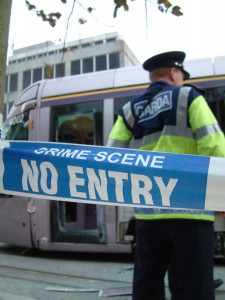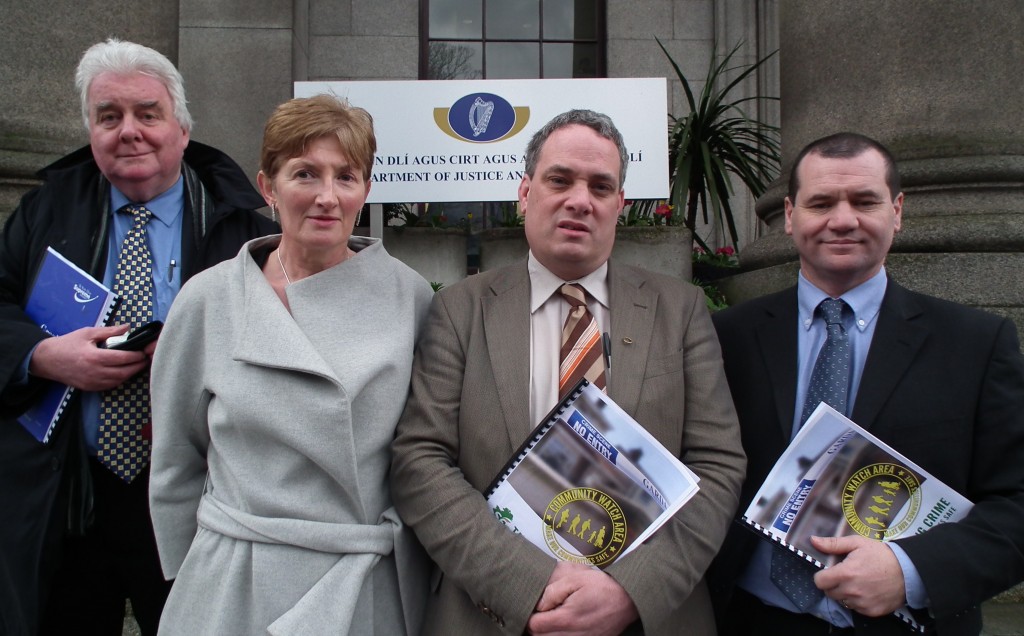10 February 2011
‘Tackling Crime – Making Communities Safe’ anti-crime policy unveiled
 Video > http://bit.ly/i4GuBt
Video > http://bit.ly/i4GuBt
SINN FÉIN has launched the party’s proposals for dealing with crime. Tackling Crime – Making Communities Safe contains 24 proposals which Dublin South Central TD Aengus Ó Snodaigh says could make huge inroads into tackling crime "and making our communities a safer place to live".
Speaking at the Department of Justice today, Aengus Ó Snodaigh said:
People have the right to feel safe in their own homes and communities. We in Sinn Féin are committed to making communities tormented by anti-social behaviour, crime and drugs safer communities.
This document contains some 24 proposals which could make huge inroads into tackling crime and making our communities a safer place to live.
Our proposals would see the number of Gardaí and community Gardaí on the ground increased while also focusing on building better relationships between the community and the Gardaí. We would also put resources into diverting young people away from involvement in drugs, crime and anti-social behaviour.
Older people and those living on their own or in isolated areas must feel secure in their homes.
Women, and young people in particular, have the right to feel safe in their community and in our towns and cities, day and night.
Our proposals are comprehensive and they are credible. This must be a priority issue for any new incoming government. We must work to rid communities of the torment of crime and anti-social behaviour.
Sinn Féin is committed to implementing polices to make communities safe.
Sinn Féin is committed to:
a) Boost Garda numbers by ending current recruitment, promotion and overtime embargoes. A far-reaching process of civilianisation to free-up fully trained Gardaí from administrative and other duties to fight crime is essential and must be expedited.
b) Increase Garda resources in rural Ireland to allow Gardaí to serve the community fully and end the policy of closing rural Garda stations.
c) Scrap the Garda Reserve and use the money saved to employ full-time Gardaí.
d) Increase funding for Garda Drugs Units with enhanced community input into their use and priorities and guarantee the future of the ‘Dial to Stop Drug Dealing’ non-Garda confidential phoneline.
e) Raise Garda visibility and activity in areas of high crime at the times required by reassigning Gardai from desk duties to the beat. Secure a greater number of sniffer dogs and handlers skilled in the detection of drugs and firearms.
f) Properly resource and equip An Garda Síochána, the office of the DPP, the Courts Service and the State Forensic Laboratory to detect, investigate and secure sound convictions. This must include the roll out of the secure digital radio system and appointment of more Criminal Asset Profilers.
g) Addressing the large number of alcohol outlets by imposing further restrictions on them and giving more power to Joint Policing Committees and local authorities to decide on location and opening hours.
h) Tackle organised crime – Ensure existing laws are used more effectively together with sufficient resources to ensure more robust and systematic investigations to target organised crime.
i) Invest all monies confiscated by the Criminal Assets Bureau in the communities worst affected by crime.
j) Keep victims of crime, especially of violent crime, fully informed throughout the investigation and prosecution process and at pre-release stage.
k) Ensure consistent prosecution of sexual assault, rape and domestic violence. Enlarge the network of Sexual Assault Treatment Centres and increase funding to sexual assault victim support services. Where appropriate, ensure attachment of conditions of release that prevent an offender from returning to an area where a victim lives or works and implement swift sanctions for sex offenders who break these or other conditions.
l) Introduce practical protections for juries and witnesses. Develop and place a revamped Witness Protection Programme on a statutory footing.
m) Improve efficiency in the courts service by reducing court holidays to four weeks per year and introducing longer sitting days.
n) Introduce sentencing guidelines and judicial training to ensure that sentences handed down are appropriate to the crime committed and the harm caused to the victim and the community.
o) Civilianisation of appropriate administrative posts or duties under Garda management and supervision, to ensure that all fully trained Garda officers can focus on police work in and with the community.
Community Policing
- Progress has been made in the roll out of community guards in certain areas and a more proactive attitude towards community policing. The number of Gardaí officers employed full-time on community policing should be increased and the position developed into an attractive career option. The difficulties involved in filling such positions with the right candidates should be addressed and the high turnover in this post reversed by changing some Garda perceptions of the post and its status through radically altering the current norms governing promotions and career development in An Garda Síochána.
- Ensure that An Garda Síochána becomes truly representative of the communities it serves by implementing Strategic Goal number 5 of the Garda Policing Plan 2008 that addresses affirmative action to include and promote ethnic minorities, and supplement that with a similar measure targeting urban working class communities.
Joint Policing Committees
- Ensure that at least one JPC functions in every Local authority area, and that an additional local Subcommittee or Policing Forum is set up wherever need is identified.
- Ensure all-party and increased community representation on the JPCs. Community/voluntary sector representation should constitute at least 1/3 of members (complementing another 1/3 statutory agency representation), and selection should be based on a transparent, democratic process, not hand-picking by the Council.
- Ensure that all JPCs regularly convene public meetings as a matter of priority, supported by an outreach programme to increase and diversify participation.
- Each year in September the JPCs should invite submissions from the public on the topic of the following year’s annual policing plan.
- Also in September the relevant Garda Officers should provide the JPC with a report on the operation of the local policing plan to date.
- In October each JPC should have a single item agenda meeting the purpose of which is to agree and sign-off on recommendations for the next year’s local annual policing plan. This should include recommendations for local rostering arrangements.
- All councils should establish a Crime and Anti-Social Behaviour Division drawing staff from Housing, Community, Environment and Planning Departments, which can act as a secretariat for the JPC.

Launching Sinn Féin's 'Tackling Crime – Making Communities Safe' policy: Cllr Larry O'Toole (Dublin North-East), Helen McCormack (Dublin North Central), Aengus Ó Snodaigh TD (Dublin South Central) and Paul Donnelly (Dublin West)
Follow us on Facebook
An Phoblacht on Twitter
Uncomfortable Conversations

An initiative for dialogue
for reconciliation
— — — — — — —
Contributions from key figures in the churches, academia and wider civic society as well as senior republican figures




